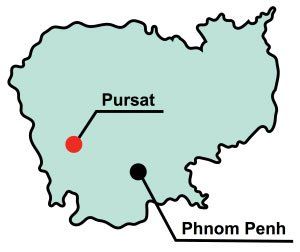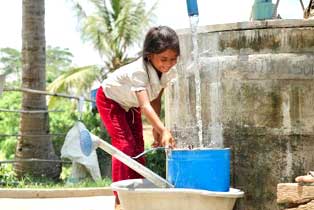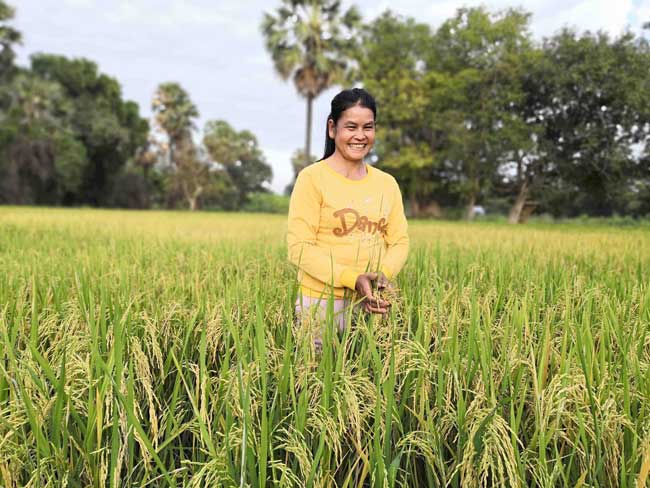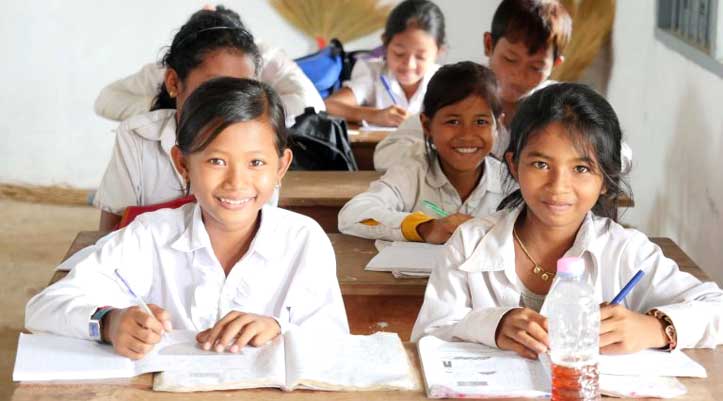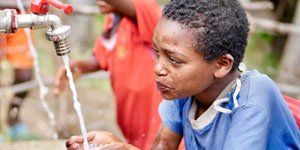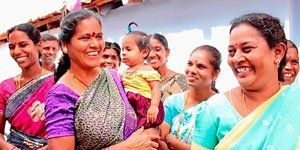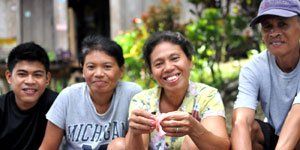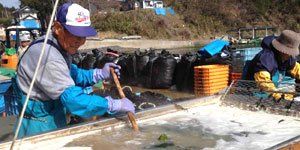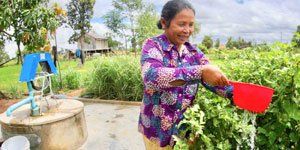The civil war was still ongoing when HOPE International Development Agency first became involved in Pursat, Cambodia in 1991. Back then, Pursat, in Western Cambodia, was one of the poorest provinces in one of the world’s poorest countries. While the need for our work there is still great, substantial changes have taken place, and it is estimated that HOPE’s work has lifted over 15,000 people out of poverty.
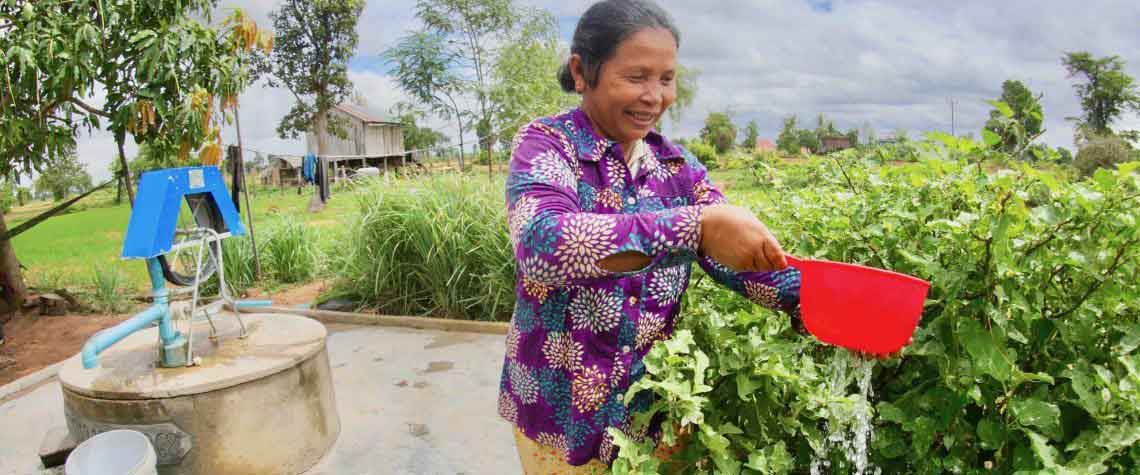
Cambodia
Over 500 wells installed and 15,000 people lifted out of poverty
Clean Water and Sanitation & Hygiene Education
A large part of HOPE’s focus in Pursat has been on the provision of clean water and sanitation. Since 2002, 1,300 wells have been installed and continue to supply thousands of families with clean water. Families assist with installation of the wells and undergo maintenance training, so that they can take full ownership of their wells upon completion. These wells and the training, compost latrines and home gardens offered in conjunction, have enabled all these families to be in better health, increase farming productivity, generate more income and send their children to school.
Dry-Season Rice Project
Rice is a staple crop in Cambodia. In the rural regions of Pursat Province some 80% of the population are rice farmers who rely on rain-fed agriculture (※1). However, this form of farming only allows for harvests once a year and is susceptible to drought and weather fluctuations, which results in unstable crop yields. As food security and nutrition problems get worse, farmers are plunged into further difficulties.
In order to support these farmers, HOPE Japan joined the Dry Season Rice cultivation project in 2019 with the support of the HOPE network that had previously implemented similar interventions.
In cooperation with our local partner, the Development Family Program (DFP), we are supporting Dry-Season Rice farming to increase the income and economic independence of 338 farmers in the Bakan District of Pursat Province.
※1 A farming method that relies on rainfall for water
Dry-Season Rice farming uses specific varieties of rice that can grow in water-scarce conditions and are resilient to climatic variations. These types of rice grow quickly and can be cultivated regardless
of the dry or the rainy season, thus allowing for three harvests a year resulting in increased crop yields. This will improve food security and raise family incomes through the selling of excess rice in the market, thus leading to self-reliance.
The main activities of the project are the capacity development of Cambodians in Pursat Province to sustain Dry-Season Rice farming, by establishing agricultural committees, providing technical guidance to farmers, provision of seeds, agricultural equipment, and irrigation pumps. HOPE Japan also furnishes rice milling machines that can be used in each of the villages together to support processing rice for consumption.
Support for Education and School Lunches
Water, Sanitation & Hygiene Education, and Micro-Credit
| Ongoing since 2019 | Construction of 10 Wells, Planting Home Gardens, Sanitation & Hygiene Education, Construction of 45 Latrines, Microcredit Training Program Location: Somlanh Village *Well construction changed due to project site geology. Prior to 2019 wells were manually dug to a depth of 7 meters. In Somlanh Village, heavy equipment digs wells to depths of 50 meters or more. |
| 2018 | Construction of 40 Wells, Planting Home Gardens, Sanitation & Hygiene Education, Construction of 40 Latrines, Microcredit Training Programs Location: Ream Rey Village |
| 2016~2017 | Construction of 150 Wells, Planting Home Gardens, Sanitation & Hygiene Education, Construction of 150 Latrines, Microcredit Training Programs Location: Ta Deis Village, Toul Pong Ro Village |
| 2014~2015 | Constructing 150 wells, helping people with home gardens, health and hygiene education, microcredit Location: Preik One Village, Ankrong Village |
| 2012~2013 | Constructing 100 wells, helping people with home gardens, health and hygiene education, microcredit Location: Bot Romudual Village, Kandal Village, Prahos Kbal Village |
| 2010~2011 | Constructing 100 wells, helping people with home gardens, health and hygiene education, microcredit Location: Oromchang Village, Krorbao Village |
Dry-Season Rice Cultivation
| Ongoing since 2019 | Established Agricultural Committee (capacity development), Technical Guidance, Provision of Seeds, Materials, and Community rice-milling machines Location: 10 villages in Bakan |
School Construction and School Lunch
| 2020 | Building elementary school, furniture and fixtures installation Location: Somlanh Village |
| 2019 | Expansion of middle school classrooms, furniture and fixtures installation Ankrong Village |
| 2018 | Building middle school, furniture and fixtures installation Ankrong Village |
| 2017 | Expansion of elementary school classrooms, furniture and fixtures installation Business location: Ta Deis Village |
| 2016 | Building elementary school, furniture and fixtures installation Business location: Ta Deis Village |
| 2015 | Building elementary school, furniture and fixtures installation Location: Ankrong Village |
| 2014 | Building secondary school, furniture and fixtures installation Location: Preik One Village |
| 2013 | Building elementary school, furniture and fixtures installation Location: Ptea Rong Village |
| 2012 | Building elementary schools, furniture and fixtures installation Increasing the number of classrooms in elementary schools, school lunch program Location: Oromchang Village, Chan Serey Village |
| 2011 | Building junior high schools, furniture and fixtures installation Building elementary schools, furniture and fixtures installation Location: O Russey Village, Chan Serey Village |
| 2010 | Increasing the number of classrooms in elementary schools, furniture and fixtures installation Location: Domnak Kanseing Village |
PROJECT DETAILS
OUR PROJECTS
Ethiopia
Since 2001, HOPE-JP water supply systems in 13 villages have brought 27,000 people clean water...
India
India Families lifted out of poverty and living self-reliantly...
The Philippines
HOPE-JP has been working in the Philippines since 2003, helping families and communities in need become self-reliant...
Cambodia
Over 500 wells installed and 15,000 people lifted out of poverty...

